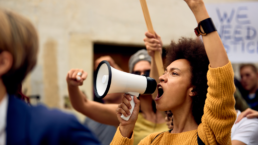We’re lucky to have more Black movement leaders active today. But we’re going to lose too many of them without acting to prevent burnout.
By Dany Sigwalt, Yes! Magazine
I’m not a good friend anymore. I am burned out and have little emotional energy left to cultivate the community I’m told I’m supposed to lean on for support. I am writing this three years into my role as executive director of Power Shift Network, a climate justice organization, and parenting a toddler, during what we now just call “these unprecedented times.”
This is not a unique experience, especially for Black organizers and leaders. But it feels distinct now that it’s happening to me. What is actually a widespread, sector-wide problem has been pushed behind closed doors and turned into a private problem for individuals to solve using their personal resources. The truth is, burnout among Black activists and the organizational refusal to address it has serious implications for who remains in leadership roles and, therefore, how and if social justice movements are able to build the possibilities of a future beyond rapidly escalating climate catastrophe and fascism.

Yes, We Have More Black Leaders—But at a Personal Cost to Us
Since the 2020 racial justice uprisings, we’ve seen businesses, organizations, and foundations prioritize Black leadership to address systemic racism. In the climate justice movement, a wave of new leaders of color, especially Black women, are taking the helm of organizations across the nation (from The Solutions Project to Greenpeace to Young Invincibles and more)––organizations that were built on the backs of racist systems that we’re now being asked to transform in order to shift the horrific political and ecological realities we’re facing across the U.S. and the globe.
Recent Posts
“Arrest Now, Ask Questions Later”: Why Did L.A. ICE Agents Arrest and Jail U.S. Citizen Andrea Velez?
July 3, 2025
Take Action Now “They didn’t have vests that said ICE or anything. Their cars didn’t have license plates. … Just because of the color of our…
Trump’s Big, Beautiful Bill Is Naked Class War
July 3, 2025
Take Action Now Trump’s “Big, Beautiful Bill” trades tax cuts on millionaires for the dissolution of society.By Hamilton Nolan, In These Times…
Mayor Mamdani’s First Day, A Zero Hour Conversation With Richard Wolff
July 2, 2025
Take Action Now If elected, what would Mayor Mamdani do on his first day in City Hall? How would a democratic socialist govern as a big-city mayor?……
The U.S. Is Funding A Bloodbath At Gaza Aid Centers
July 2, 2025
Take Action Now The admin just gave $30M to GHF, the organization at the center of charges that Israel is weaponizing assistance and shooting at…




